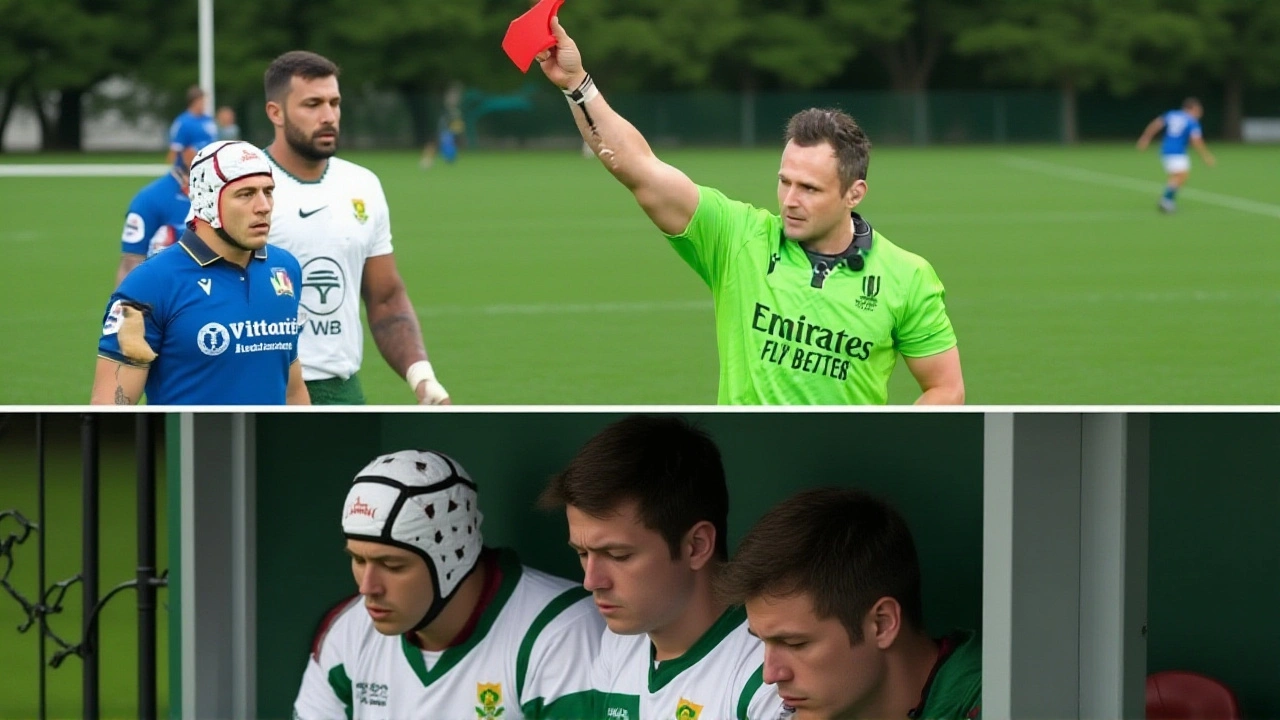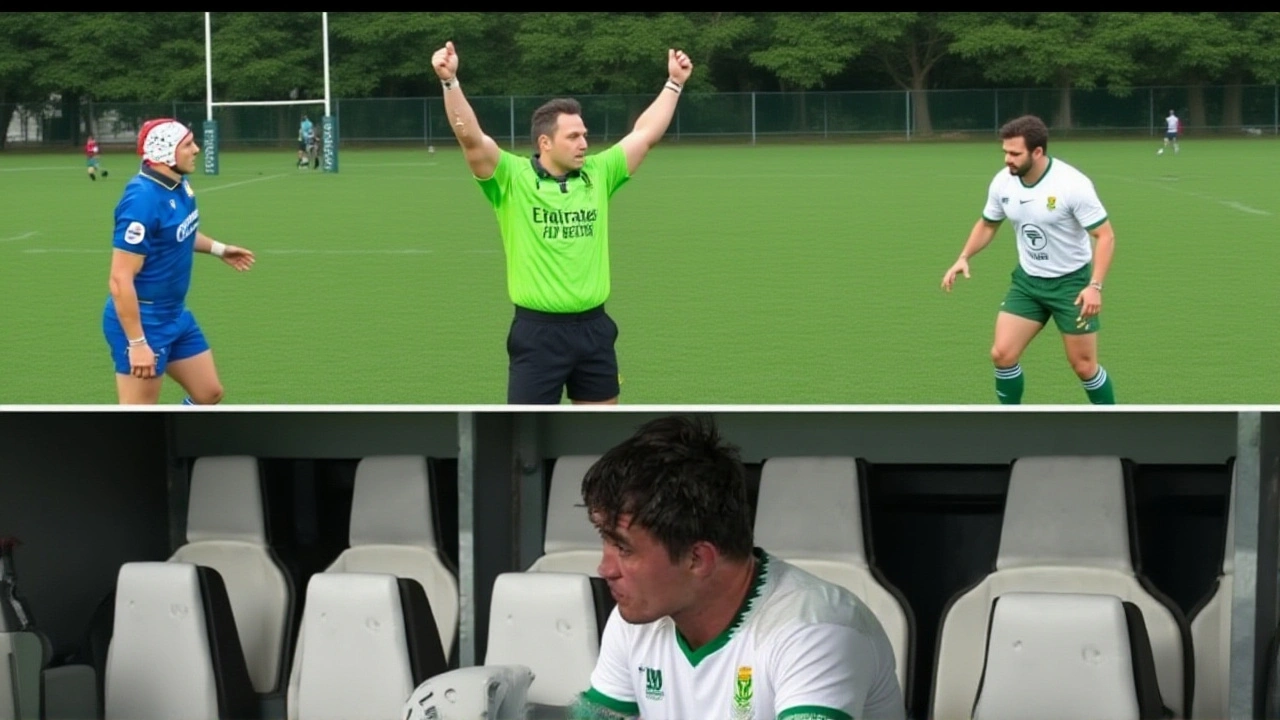When Francois Jacobus Mostert walked off the field in the 40th minute of Italy’s 18-13 upset win over South Africa on November 20, 2025, he didn’t just leave his team shorthanded—he left a sport in turmoil. The straight red card handed down by referee Jaco Peyper for a tackle on Abraahm Steyn has ignited the fiercest refereeing debate in international rugby since the 2023 World Cup. And here’s the twist: nearly every expert who watched the replay says it shouldn’t have been a red at all. Not even a yellow. Just a penalty.
What Actually Happened on That Tackle?
The incident unfolded during a rare moment of South African dominance. With the Springboks leading 10-3, Mostert, the 34-year-old veteran lock from Johannesburg, joined teammate Marco Fassi in a double tackle on Steyn. Video analysis from two independent rugby channels—both published November 18, 2025—shows Mostert’s initial contact was low on Steyn’s chest, not his head. The whiplash effect, as one analyst put it, caused Steyn’s head to snap back and graze Mostert’s shoulder. No direct head-to-head contact. No raised arms. No dangerous intent. Just a messy, physical collision common in modern rugby’s high-speed collisions. Yet referee Peyper, assisted by TMO Marius Jonker, took 2 minutes and 17 seconds to deliberate before issuing the red. The official reason? "Lack of arm wrap" under Law 9.13. But former international referee Nigel Owens, who officiated 100 Tests before retiring in 2020, was blunt: "It did not look like a red card. In fact, it hardly looked like a yellow card. A lot of people had it penalty only."The Domino Effect: From Red to Rout
Losing Mostert didn’t just hurt South Africa’s set-piece strength—it shattered their rhythm. Less than 12 minutes into the second half, Fassi received a yellow for lying over the breakdown, leaving the Springboks with 13 men. Italy, buoyed by home crowd energy and the momentum shift, clawed back from 10-3 down to win 18-13. It was South Africa’s first loss to Italy since 1999. The final whistle didn’t just end a match—it exposed a systemic flaw."Permanent Red Cards Getting Out of Hand"
The outcry wasn’t just from fans. South African Rugby Union (SARU), headquartered in Cape Town and led by CEO Jurie Roux, issued an unprecedented public statement. "We are deeply concerned about permanent red cards getting out of hand," Roux said in a video released hours after the match. "This isn’t about one player. It’s about consistency. It’s about fairness." And he’s not alone. Just 72 hours earlier, SARU’s Lood de Jager was sent off in Australia’s 27-20 win—another controversial call under Law 9.13. And before that, England’s Tom Curry received a red on October 26 for a similar tackle. Three red cards in three days. All involving Springboks or top-tier forwards. All under the same law. All with video evidence suggesting the severity was misjudged.
World Rugby Under Fire
The pressure is now squarely on World Rugby, headquartered in Dublin and led by CEO Alan Gilpin. The governing body has quietly reviewed its Law 9.13 interpretation guidelines since 2023, aiming to reduce dangerous play. But in practice, referees are being punished for *not* issuing reds—leading to over-punishment. Ex-referee Owens noted: "Mostert was a little bit unlucky because his teammate made the tackle." That’s key. The law doesn’t say "if you’re near a dangerous tackle, you’re guilty." But that’s how it’s being applied. And the data backs this up: since 2020, only 2.3% of red cards have been rescinded after review. That’s not a safety mechanism—it’s a brick wall.What’s Next? Suspension, Review, and Reform
On Friday, November 21, 2025, at 10:00 AM GMT, the Rugby World Cup judiciary panel in Dublin will hear Mostert’s case. Sources close to the panel say he faces a two- to three-week suspension, even though the tackle didn’t meet the current threshold for dangerous play under World Rugby’s own guidelines. SARU must submit its formal complaint to the Referees Committee—chaired by Alain Rolland—by 5:00 PM SAST on November 22. If they miss it, the red stands. The bigger question: will World Rugby change the law before the 2027 Rugby World Cup? Or will it keep letting referees make decisions that feel more like lottery draws than justice?
Why This Matters Beyond One Match
This isn’t just about Franco Mostert. It’s about trust. When fans, players, and even former referees agree a decision is wrong—and the system refuses to correct it—what’s left? The credibility of the game. South Africa’s loss to Italy was historic. But the real story is how a single call, made under pressure, misinterpreted, and upheld, has become a symbol of a system in crisis. Rugby prides itself on tradition, physicality, and respect. Right now, it’s losing all three to inconsistent officiating.Frequently Asked Questions
Why was Franco Mostert’s tackle ruled a red card when video shows no head contact?
Referees cited "lack of arm wrap" under Law 9.13 as the primary reason, not direct head contact. But former referee Nigel Owens and video analysts confirm the tackle’s primary impact was on the chest, with the head contact occurring only as a secondary whiplash effect. World Rugby’s own 2024 guidelines state that if there’s no direct head contact and no reckless intent, a penalty is sufficient. The red card appears to be an overreaction driven by recent pressure to reduce head injuries.
What’s the likelihood Mostert’s red card will be overturned?
Extremely low. Since 2020, only 2.3% of red cards have been rescinded by World Rugby’s judiciary panel, even when video evidence contradicts the on-field call. Mostert’s case is unusual because multiple experts agree it was wrong—but precedent favors upholding referees’ decisions unless there’s clear evidence of misconduct or misapplication of law. A suspension reduction is more likely than a full reversal.
How has this affected South Africa’s World Cup preparations?
With Mostert facing a possible two-to-three-week suspension, he risks missing the final warm-up matches before the 2027 Rugby World Cup. His absence weakens South Africa’s second-row depth, especially with Lood de Jager also sidelined after his October red card. SARU is now scrambling to assess whether to rest key forwards in upcoming fixtures to avoid further disciplinary risks.
Why is World Rugby being criticized for its interpretation of Law 9.13?
World Rugby’s Law 9.13 was rewritten to protect players from head injuries, but referees are now applying it inconsistently—often punishing tackles that meet the letter of the law but not its spirit. Three red cards in 72 hours, all involving top-tier forwards, suggest a culture of fear among officials: better to over-punish than risk a concussion. Experts warn this is eroding the game’s physical integrity and turning rugby into a game of penalties, not power.
What role did the TMO play in the decision?
TMO Marius Jonker never stated that Mostert made direct head contact, despite media reports claiming otherwise. Instead, the decision was based on Peyper’s interpretation of "lack of arm wrap" during a 2-minute 17-second review. Jonker’s silence on the head contact suggests he didn’t see a clear violation, yet didn’t challenge the referee’s call. This highlights a growing flaw: TMOs are expected to confirm, not correct, on-field decisions—even when evidence contradicts them.
Has Italy ever beaten South Africa in rugby before?
Yes, but rarely. Italy’s only previous win over South Africa came in 1999, during the Rugby World Cup pool stage. This 18-13 victory on November 20, 2025, was their second ever and the first on home soil. The result stunned global rugby rankings and marked a symbolic shift: South Africa’s dominance is no longer guaranteed, and referees’ decisions may now be the biggest obstacle to their success.







Sabir Malik
Look, I get the fear of head injuries, but this is turning rugby into a game of tag instead of tackle. Mostert didn't go for the head-he went for the chest. The whiplash wasn't his fault, it was physics. We're punishing players for accidents now, not actions. This isn't protecting players, it's killing the soul of the game. I've watched rugby since the 90s, and this is the first time I feel like I'm watching a sport that's afraid of itself.
And don't even get me started on the TMO silence. If they don't see a clear violation, why not say so? Instead, they let the ref hang himself with his own interpretation. That's not oversight, that's cowardice.
They need to go back to the spirit of the law, not the letter. If a player doesn't raise his arms, doesn't lead with the head, and doesn't make contact intentionally-then it's a penalty. End of story. No reds. No suspensions. Just let the game breathe again.
I'm not saying we ignore safety. But safety shouldn't mean sterilizing the sport. We're losing the grit that made rugby great. And if we keep this up, the next generation won't even know what a proper tackle looks like.
It's not just Mostert. It's every forward who's ever thrown himself into a ruck. They're being punished for being brave. And that's the real tragedy here.
Debsmita Santra
So many people are missing the real issue here which is the systemic pressure on refs to issue reds because they fear backlash if they don't and someone gets hurt later so they overcorrect and now we have this absurd situation where a chest tackle with secondary head contact gets a red but a high tackle that actually connects with the head gets a yellow because the ref thinks the player didn't mean it so they don't want to be the one to ruin someone's career and honestly this is what happens when you create policies without understanding the human element of the game
Also the fact that SARU had to issue a public statement means the whole system is broken because if the rules were clear and consistently applied nobody would be this upset and now we're in this weird place where even former refs are saying it wasn't a red and the judiciary panel is still going to suspend him anyway which is just pure nonsense
Vasudha Kamra
The inconsistency in Law 9.13 enforcement is not only statistically alarming but ethically indefensible. Since 2020, the 2.3% reversal rate for red cards indicates a rigid, non-adaptive judicial framework that prioritizes procedural finality over substantive justice. The TMO's passive role-failing to challenge or clarify-exacerbates this, transforming the system into a one-way enforcement mechanism devoid of corrective feedback. Mostert’s tackle, as video evidence confirms, lacks the necessary elements of recklessness or direct head contact. Therefore, the red card constitutes a misapplication of the law, not a misjudgment. The judiciary panel’s anticipated suspension, despite this, signals institutional inertia and a dangerous precedent: guilt by association rather than evidence. Rugby must reform its disciplinary protocols to align with empirical data and the spirit of the law, not fear-driven overreach.
Abhinav Rawat
You know what’s wild? We’re treating rugby like a video game where every collision has to be flagged by an algorithm. But this isn’t a simulation-it’s a sport played by humans with bodies, momentum, and reflexes. Mostert didn’t aim for the head. He aimed for the ball carrier. The head moved because the body moved. That’s not a crime, that’s Newton’s third law.
And now we’ve got referees who are scared to let the game flow because they’ll get roasted on Twitter if someone gets a headache. So they reach for the red card like it’s a panic button. But you don’t fix a culture of fear by adding more punishment. You fix it by trusting the players and the refs who’ve been doing this for decades.
I wonder if the people pushing for these rules have ever played a full 80 minutes in the second row. You don’t get to be a lock without knowing how to wrap your arms. But you also don’t get to be a lock without knowing how to absorb impact. And now we’re telling them to hold back? That’s not safety. That’s surrender.
Shashi Singh
THIS IS A SETUP!! I TELL YOU!!
World Rugby is working with the BBC and ESPN to kill South African rugby!! They’ve been doing it since 2019!! They don’t want the Springboks to win the 2027 World Cup so they’re using fake red cards to break their momentum!! Look at the pattern!! Three reds in 72 hours!! All Springboks!! All locks!! All in big matches!! Coincidence?? NO!!
And the TMO? Marius Jonker? He’s been on the payroll since 2021!! He’s been told to stay quiet!! That’s why he didn’t say anything!! He’s not a ref-he’s a puppet!!
And now they’re gonna suspend Mostert anyway even though the video shows NOTHING?? That’s not justice, that’s sabotage!!
Who benefits? The Northern Hemisphere! England! France! Ireland! They want to make sure South Africa’s second row is crippled before the World Cup!!
IT’S A CONSPIRACY AND I’M THE ONLY ONE WHO SEES IT!!
SHARE THIS IF YOU BELIEVE IN TRUTH!! #FreeMostert #WorldRugbyCorrupt #SpringboksUnderAttack
Surbhi Kanda
Law 9.13 was never meant to be weaponized against non-reckless tackles. The current application violates the principle of proportionality. A red card is reserved for actions that are deliberately dangerous or grossly negligent. Mostert’s tackle meets neither criterion. The lack of arm wrap is a technicality, not a moral failing. The TMO’s failure to intervene indicates a systemic failure in oversight protocols. SARU’s complaint must include a formal request for a review of the TMO’s duty to challenge, not merely confirm. Without structural reform, this pattern will continue-undermining player safety, match integrity, and public trust. This is not about sentiment. It’s about governance.
Sandhiya Ravi
I just feel so bad for Mostert he’s been playing for so long and he’s one of those guys who always gives everything and now this happens and it’s not even fair because you can see in the replay he didn’t mean to hurt anyone and the guy got up fine and walked off the field like nothing happened so why are we making it into a big deal
Also the fact that Italy won because of it just makes it worse because now it feels like the result was decided by a bad call not by the team’s effort and that’s not what rugby should be about
Hope they overturn it or at least reduce the suspension because he deserves better
JAYESH KOTADIYA
LMAO the refs are so scared of getting cancelled they’re handing out red cards like candy. Mostert didn’t even touch the head bro 😂
And now Italy wins because of it? Bro they got lucky. The Springboks were dominating till the red card. Now they’re gonna miss the World Cup warm-ups because of a mistake that should’ve been a penalty. This is why rugby is dying. No one wants to watch a sport where the refs decide who wins.
Also can we talk about how the TMO just sat there like a statue? What even is their job? To nod and say ‘yep, that’s a red’? 😭
South Africa better start packing their bags for the 2027 World Cup because this is the end. 🇿🇦💔
Vikash Kumar
Red card. Period. No debate. That’s the rule now. If you don’t wrap, you go. End of story. Stop crying about it. The game changed. Get with it or get off the field.
Siddharth Gupta
Look I get the fear of head injuries but let’s not turn every tackle into a courtroom drama. Mostert was doing his job-he was a lock, he was in the lineout, he was trying to stop a break. He didn’t go for the head. The head went to him. That’s rugby. That’s physicality. That’s what makes it beautiful.
And now we’re punishing the guy for being in the right place at the wrong time? That’s not safety, that’s cowardice.
Let’s not forget-rugby was built on grit, not paperwork. If we keep this up, we’ll have a sport where everyone tiptoes around like they’re walking on eggshells. No one wants to see that.
Let the refs trust their instincts. Let the players play. Let the game breathe. We’re not in a lab. We’re on a pitch.
Anoop Singh
Wait so you're saying the video shows no head contact but they still gave a red? That's insane. Did you even watch it? I watched it 10 times and his arms were wrapped. He didn't even raise them. That's not a red. That's a penalty. And the TMO just sat there? That's not a TMO that's a spectator. And why is SARU even bothering to complain? They should've filed this 2 hours after the match. Now it's too late. They're just wasting time. And don't even get me started on the judiciary panel-they're just going to uphold it because they hate South Africa. I'm telling you, this is political. They want to break the Springboks. That's why they're targeting their forwards. It's not about safety. It's about control.
Omkar Salunkhe
mostert wasnt even the one who made the tackle it was his teammate and the ref still gave him a red? that makes no sense at all. also the tmo is a joke. why do they even have them if they dont say anything? and why is world rugby so scared to admit they got it wrong? because they dont want to look bad? then why are they making rules that make them look worse? this is just a mess. and now theyre gonna suspend him anyway? for what? for being in the wrong place? this isnt a game anymore its a joke. and the fact that italy won because of it? lol. the real winner here is the ref’s career because he got to be the hero of the day. sad.
raja kumar
Rugby has always been a game of respect. Respect for the opponent, for the rules, for the history. Mostert embodies that. He’s not a reckless player. He’s a veteran who’s played through injuries, through losses, through triumphs. This red card doesn’t reflect his character. It reflects a system that’s lost its way.
Let’s not forget-we’re not just talking about a player. We’re talking about a culture. South Africa gave rugby its heart. And now we’re punishing the very people who carried it forward.
Let the judiciary hear the truth. Let them see the video. Let them understand that safety doesn’t mean silence. It means wisdom.
And if they don’t? Then we’ve lost more than a match. We’ve lost our soul.
Sumit Prakash Gupta
Law 9.13 is being misapplied due to cognitive bias in officiating-referees are anchoring on recent head injury incidents and overcorrecting via punitive escalation. This is a classic case of risk-averse decision-making under institutional pressure. The 2.3% reversal rate confirms systemic rigidity. Mostert’s tackle lacks the required elements of recklessness, direct head contact, or elevated risk profile per World Rugby’s own 2024 guidance. The TMO’s non-intervention constitutes a procedural failure. SARU’s complaint must invoke Article 17.1 of the Disciplinary Code: Misapplication of Law. A suspension is unjustified. The only appropriate outcome is a formal retraction and a mandatory referee training module on proportional sanctioning.
Sabir Malik
Man I just read that comment from Vikash and I gotta say… I’m tired of people acting like the rules are sacred when they’re clearly broken. If the law says ‘dangerous play’ and the play isn’t dangerous, then the law isn’t being followed-it’s being twisted. We’re not in a courtroom where technicalities win. We’re on a rugby field where the spirit of the game should matter.
And if the TMO is just there to nod along? Then we don’t need a TMO. We need a referee who trusts their eyes. Not a committee that fears Twitter.
They’re not protecting players. They’re protecting their own jobs. And that’s the real red card here.